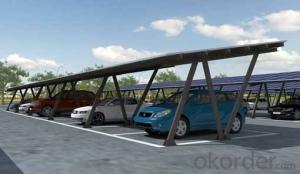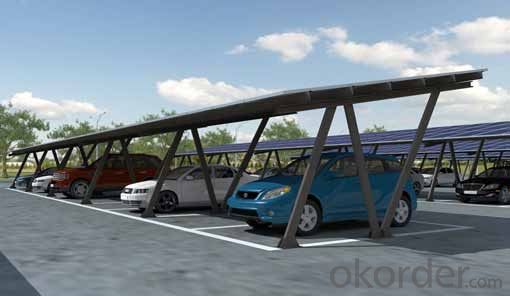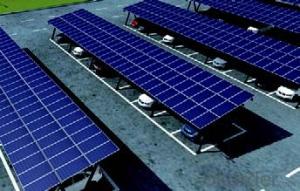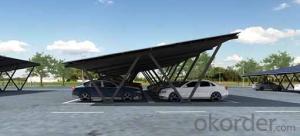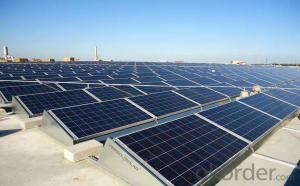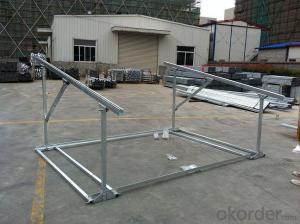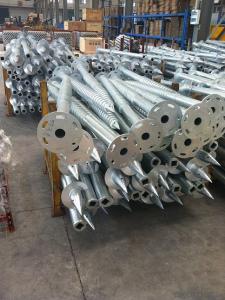Solar Energy Systems Texas:Solar Mounting System Carport System
- Loading Port:
- China Main Port
- Payment Terms:
- TT OR LC
- Min Order Qty:
- -
- Supply Capability:
- -
OKorder Service Pledge
Quality Product, Order Online Tracking, Timely Delivery
OKorder Financial Service
Credit Rating, Credit Services, Credit Purchasing
You Might Also Like
Product Features
• No location limitation
• Simple structure, easy & quick installation
• Use standard components, low maintenance cost
• Easy to be packaged, minimized transportation cost
• Removable & reusable
• With waterproof & non-water proof solutions for choice
• Customization available
- Q: How does a solar energy system work?
- A solar energy system works by capturing sunlight using photovoltaic (PV) panels or solar thermal collectors. The PV panels convert sunlight directly into electricity by using semiconductor materials, while solar thermal collectors use sunlight to heat water or air for various purposes. The electricity generated by the PV panels can be used to power homes or businesses, or it can be stored in batteries for later use. Additionally, excess electricity can be fed back into the grid for credit or sold to utility companies. Overall, solar energy systems harness the power of the sun to provide clean and renewable energy.
- Q: What is the lifespan of solar batteries used in solar energy systems?
- The lifespan of solar batteries used in solar energy systems typically ranges from 5 to 15 years, depending on various factors such as the type of battery, usage patterns, maintenance, and environmental conditions.
- Q: Can solar energy systems be used in powering warehouses or distribution centers?
- Yes, solar energy systems can be used to power warehouses or distribution centers. Solar panels can be installed on the roofs of these buildings to convert sunlight into electricity, which can then be used to meet their energy needs. This can help reduce reliance on traditional energy sources and lower operating costs while also promoting sustainability.
- Q: How long does it take to recoup the investment in a solar energy system?
- The time it takes to recoup the investment in a solar energy system can vary depending on factors such as the cost of the system, the amount of energy it generates, the local electricity rates, available incentives, and the individual's energy consumption. On average, it typically takes around 5 to 10 years to recoup the initial investment in a residential solar energy system. However, with decreasing equipment costs and increasing government incentives, this payback period is continually reducing, making solar energy a more financially viable option for many individuals and businesses.
- Q: What are the different applications of solar energy systems in transportation?
- Solar energy systems can be applied in various ways in transportation to reduce carbon emissions and dependence on fossil fuels. One application is in electric vehicles (EVs), where solar panels can be installed on the roof or hood of the vehicle to harness solar energy and charge the batteries. This can extend the range of EVs and reduce the need for charging from the electrical grid. Solar energy can also be used in charging stations for EVs. These charging stations can be equipped with solar panels to generate electricity and provide clean energy for charging EVs. This reduces the reliance on non-renewable energy sources and contributes to a more sustainable transportation system. Another application of solar energy systems in transportation is in public transportation. Solar-powered buses and trains can be used to provide emissions-free transportation options, reducing air pollution and improving air quality in cities. Solar panels on the roofs of these vehicles can provide power for various onboard systems such as lighting, air conditioning, and information displays, further reducing energy consumption. In addition to EVs and public transportation, solar energy systems can also be used in other modes of transportation such as bicycles and boats. Solar panels can be integrated into the design of these vehicles to generate electricity for powering electric motors or charging batteries, making them more energy-efficient and environmentally friendly. Overall, the applications of solar energy systems in transportation are diverse and offer significant potential for reducing greenhouse gas emissions and promoting sustainable transportation options. By harnessing the power of the sun, we can create a cleaner and greener future for transportation.
- Q: Can solar energy systems be used in powering electric fences or security systems?
- Yes, solar energy systems can certainly be used in powering electric fences or security systems. Solar panels can generate electricity by converting sunlight into energy, which can then be stored in batteries or used directly to power various devices. This makes solar energy systems a practical and sustainable choice for powering electric fences or security systems, especially in remote or off-grid locations where traditional power sources may be unavailable or unreliable. Solar-powered electric fences can effectively deter intruders or keep animals within a designated area, while solar-powered security systems can provide continuous surveillance and monitoring without the need for a constant supply of electricity. Additionally, solar energy systems are environmentally friendly and can help reduce carbon emissions associated with conventional power sources, making them an increasingly popular and cost-effective solution for powering various applications, including electric fences and security systems.
- Q: Can solar energy systems be used for powering off-grid military operations?
- Yes, solar energy systems can be used for powering off-grid military operations. Solar panels can be installed to generate electricity, which can then be used to power various equipment and facilities such as communication systems, surveillance equipment, lighting, and even temporary field hospitals. Solar energy systems offer a reliable and sustainable alternative to traditional fossil fuel generators, reducing logistical challenges and providing a more environmentally friendly power source in remote or inaccessible areas.
- Q: How much maintenance is required for a solar energy system?
- Solar energy systems typically require minimal maintenance. Regular cleaning of the solar panels to remove dust and debris is recommended to ensure optimal performance. Additionally, checking the system's components, such as inverters and wiring, at least once a year is advisable. Overall, solar energy systems are designed to be durable and reliable, requiring little ongoing maintenance.
- Q: Can solar energy systems be used for powering recycling facilities?
- Yes, solar energy systems can definitely be used for powering recycling facilities. Solar energy is a renewable and clean source of power that can be harnessed using photovoltaic (PV) panels or solar thermal systems. These systems convert sunlight into electricity or heat, which can then be utilized to power various operations within a recycling facility. The electricity generated through solar panels can be used to power the machinery and equipment required for recycling processes, such as conveyors, sorting machines, crushers, and compactors. Additionally, solar energy can also be used to power lighting systems, ventilation, and heating/cooling systems, ensuring a sustainable and efficient operation of the facility. Using solar energy for powering recycling facilities offers several advantages. Firstly, it reduces reliance on traditional fossil fuel-based electricity, thereby decreasing carbon emissions and mitigating environmental impact. Secondly, solar energy systems provide a stable and predictable source of power, reducing the vulnerability to power outages or price fluctuations. Furthermore, solar power can help recycling facilities save on energy costs in the long run, as the initial investment in solar panels can be offset by the reduced electricity bills over time. In conclusion, solar energy systems are a viable and environmentally-friendly option for powering recycling facilities. By harnessing the power of the sun, these facilities can operate sustainably, reduce their carbon footprint, and contribute towards a cleaner and greener future.
- Q: How does the performance of solar panels degrade over time?
- The performance of solar panels degrades over time due to various factors such as exposure to sunlight, temperature fluctuations, and environmental conditions. These factors can cause the panels to degrade gradually, resulting in a decrease in their efficiency and power output. Additionally, the accumulation of dirt, dust, and debris can also impact the performance of solar panels over time. Regular maintenance and cleaning can help mitigate this degradation and ensure optimal performance.
Send your message to us
Solar Energy Systems Texas:Solar Mounting System Carport System
- Loading Port:
- China Main Port
- Payment Terms:
- TT OR LC
- Min Order Qty:
- -
- Supply Capability:
- -
OKorder Service Pledge
Quality Product, Order Online Tracking, Timely Delivery
OKorder Financial Service
Credit Rating, Credit Services, Credit Purchasing
Similar products
Hot products
Hot Searches
Related keywords
